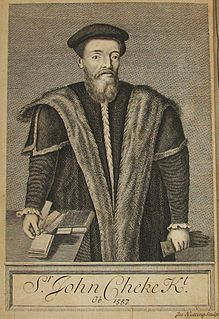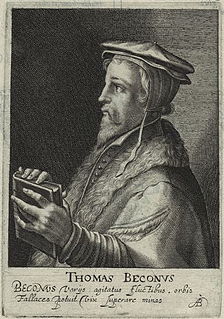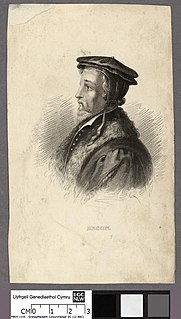Related Research Articles

Matthew Parker was an English bishop. He was the Archbishop of Canterbury in the Church of England from 1559 until his death in 1575. He was also an influential theologian and arguably the co-founder of a distinctive tradition of Anglican theological thought.

Edmund Bonner was Bishop of London from 1539–49 and again from 1553-59.

Sir John Cheke (Cheek) was an English classical scholar and statesman. One of the foremost teachers of his age, and the first Regius Professor of Greek at the University of Cambridge, he played a great part in the revival of Greek learning in England. He was tutor to Prince Edward, the future King Edward VI, and also sometimes to Princess Elizabeth. Of strongly Reformist sympathy in religious affairs, his public career as provost of King's College, Cambridge, Member of Parliament and briefly as Secretary of State during King Edward's reign was brought to a close by the accession of Queen Mary in 1553. He went into voluntary exile abroad, at first under royal licence. He was captured and imprisoned in 1556, and under threat or apprehension of execution by the fire made a forced public recantation and affiliated himself to the Church of Rome. He died not long afterwards, filled with remorse for having forsworn his true belief from the infirmity of fear. His character, teaching and reputation were, however, admiringly and honourably upheld.

John Strype was an English clergyman, historian and biographer.
Thomas Thirlby, was the first and only bishop of Westminster (1540–50), and afterwards successively bishop of Norwich (1550–54) and bishop of Ely (1554–59). While he acquiesced in the Henrician schism, with its rejection in principle of the Roman papacy, he remained otherwise loyal to the doctrine of the Roman Catholic Church during the English Reformation.

Thomas Beccon or Becon was an English cleric and Protestant reformer from Norfolk.
James Nasmith (1740–1808) was an English clergyman, academic and antiquary.
Nicholas of Lynn or Lynne, also known in Latin as Nicolas de Linna, was an English astronomer of the 14th century.
Henry Mason was an English clergyman and theological writer.
Hugh Goodacre was an English Protestant clergyman, who was briefly Church of Ireland Archbishop of Armagh and Primate of Ireland.
William Benson was an English Benedictine, the last Abbot of Westminster and first Dean of Westminster. He was a friend of Thomas Cranmer, and belonged to the evangelical circle around Cranmer that included Thomas Goodrich, Hugh Latimer and Thomas Thirlby.
John Aucher D.D., (1619–1700) was an English clergyman and royalist supporter during the Commonwealth of Britain.
Robert Bale, O.Carm.,, was an English Carmelite friar and scholar.
Thomas Yale (1525/6–1577) was an English civil lawyer.
Edmund Gurney or Gurnay was an English clergyman and anti-Catholic writer.
Ralph Morice was the secretary and biographer of Thomas Cranmer, Archbishop of Canterbury.
William Barret was an English divine.

Edward Tenison (1673–1735) was an English bishop of Ossory. An example of the workings of the system of patronage in the Church of England, Tenison also was a significant Whig and controversialist.

John Becon LL.D.,, was an English divine.
Edmund Steward otherwise Stewart or Stewarde was an English lawyer and clergyman who served as Chancellor and later Dean of Winchester Cathedral until his removal in 1559.
References
- 1 2 3 Cooper 1885, p. 275.
- Attribution
 This article incorporates text from a publication now in the public domain : Cooper, Thompson (1885). "Barret, John (d.1563)". In Stephen, Leslie (ed.). Dictionary of National Biography . 3. London: Smith, Elder & Co. p. 278. Endnotes:
This article incorporates text from a publication now in the public domain : Cooper, Thompson (1885). "Barret, John (d.1563)". In Stephen, Leslie (ed.). Dictionary of National Biography . 3. London: Smith, Elder & Co. p. 278. Endnotes: - manuscript Addit. 5863, f. 160
- Blomefield's Norfolk, iii. 663, iv. 13
- Nasmith's Catalogue of manuscripts in Corpus Christi Coll. Camb. 166, 169, 387, 399
- Bale
- Pits
- Dodd's Church Hist. i. 524
- Tanner's Bibl. British 73, 74
- Mackerell's Hist. of Lynn, 192
- Strype's Life of Cranmer, iii. 425
- Strype's Eccl. Memorials, i. 286
- Cooper's Athenæ Cantab. i. 224
- Le Neve's Fasti Eccl. Anglic. (ed. Hardy), ii. 498.